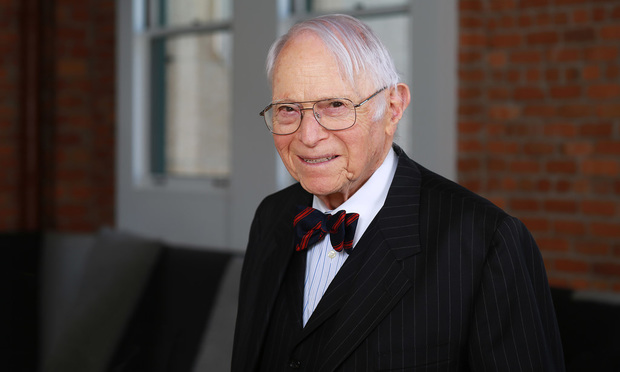For Jerry Braun, a Career of Addiction in Law
It took being hauled off by the county sheriff to put the founder of Farella Braun + Martel on the path to recovery.
May 12, 2019 at 07:00 PM
10 minute read
 Braun, a co-founder of Farella Braun + Martel, found a way forward with the Other Bar, a legal industry support group in California.
Braun, a co-founder of Farella Braun + Martel, found a way forward with the Other Bar, a legal industry support group in California.
Jerome Braun's alcohol abuse trailed him through a his career as a litigator and law firm leader. It took a doctor's intervention—and an unwelcome visit from the county sheriff—to lead him to the community of supportive lawyers that finally helped him break free.
Braun, now 89, wrote for the law review at Stanford alongside William Rehnquist and Sandra Day O'Connor. He co-founded venerable San Francisco firm Farella Braun + Martel. With work on early price-fixing cases in the gypsum wall board and plywood industries, he was a pioneer in the field of nationwide antitrust litigation. And he became a philanthropic leader in the Bay Area, serving as president of the region's Jewish Community Federation.
 These achievements all papered over a darker reality.
These achievements all papered over a darker reality.
“Pull a date out of the air: 1975, 1980. If you'd walked into my office, what you would have seen is some of what you still see today: a guy in a three-piece suit and a gold watch chain, many of the accoutrements of success—crystal vases, placards, certificates, paperweights, pen and pencil sets, all stuff in appreciation for this, that and the other,” said Braun, who goes by Jerry. “But what you wouldn't have seen is the following: I was a maintenance drinker. I was drinking around the clock. No matter what endeavor in the 24-hour cycle, it was fueled by alcohol.”
He drank sparingly as an undergraduate at the University of Southern California—maybe a half a glass of beer on a Saturday night with older dormmates. At Stanford, he drank a little more, “for reasons that are no mystery: the pressures were greater.” It was over 25-cent glasses of Burgermeister beer at a roadhouse called La Mouette that he and future partners Tom Elke and Frank Farella began to dream of starting their own firm. But alcohol was still a relatively rare indulgence.
That began to change during his military service. Braun was drafted after graduating from law school, and after a nine-month McCarthy-era delay (on a required form, he had acknowledged having gone to several events sponsored by a successor group to the Young Communist League while at USC), he received a commission to enter the Judge Advocate General in the army.
“The military made drinking easy,” he said. “In fact, they almost encouraged it.”
While stationed in France, the liquor store on base sold booze at dirt-cheap prices, and at the officers' club and enlisted men's club, beer went for 15 cents and mixed drinks for little more. Braun drank more, but it still did not become a problem.
Same for the start of his law career back in San Francisco. He was extremely cautious—avoiding alcohol at lunches even when clients were drinking—and holding off until before dinner.
“I'd make a deal with a waiter at a restaurant where I was known,” he said. “I'd use signals and high signs to let them know that I wanted a virgin mary instead of a bloody mary, so they'd bring me that.”
That restraint began to erode after Braun launched his firm with Elke and Farella at 333 Pine St. in February 1962.
“The rent was $700 a month, which was a fortune to us,” he said. “We had no clients, we had no money, we had no support, no family background, no connections, political or otherwise.”
Braun was the closest thing the firm had to a managing partner, so he was working to build the business in addition to trying cases, handling appeals, teaching night law school, and traveling around the country for cases in which he had “fooled people into thinking” he had some expertise.
“There was an enormous amount of travel, and you know what goes with an enormous amount of travel: There was a tremendous amount of drinking,” he said.
That meant booze on planes and in airport bars, and increasingly at home as well. Ultimately, Braun found himself drinking to get up and get going in the morning, in order to make it to lunch and later to dinner, through the evening meal and again in order to get to sleep. Waking at 2 a.m. in a cold sweat, he would drink more to get back to sleep.
His family imposed few obstacles. Braun doesn't believe his first wife saw he was approaching alcoholism, and she didn't counsel him to slow down. His second wife, to whom he remains married today, never put pressure on him. And while his three children presumably recognized his burgeoning problem, he remembers only one moment of judgment. Braun was taking his 14-year old son Daniel with him on a business trip to London. When the British Airways jet touched down in Seattle for a layover, and he pulled out his flask and took a swig, Daniel looked at him and proclaimed, “Dad, you're drinking too much.”
“I've never forgotten that, prophetic as it was,” Braun said.
At the firm, one intervention attempt fell short. After Farella, with the firm's fourth founding partner John Martel, called Braun to come into his office the next day at 7 a.m. to ostensibly discuss firm business, they confronted him about the consequences of his behavior.
But instead of demanding that he clean up or leave the firm, they gave him an out.
“I didn't agree to go to rehab and to quit drinking. I didn't acknowledge I was an alcoholic, because I was in denial then,” he said. “I made a deal with them that I would not drink at any firm events or public events where I would be representing the firm.”
Braun kept to the deal for a year or two before lapsing into his old ways. In subsequent years, the firm's newer managing partners would express their concerns, but that was the extent of it.
Forced Reckoning
Braun retired from his partnership in 1996. He remained active in the firm, as he does to this day, but early that August, at 66, he was at home in the Marin County town of Kentfield, drunk most of the time with his wife away at a weeklong music festival.
On Thursday, following a dinner out, Braun's doctor had invited him to play racquetball Sunday morning. At 8:30 a.m., with his wife scheduled to return later in the day, the doctor called, but Braun begged off, claiming he was in no condition to play.
“I know you're not, Jerry, I know you're in no condition, and that's why I called,” Braun recalls his doctor saying. “You gotta do something, you gotta get treatment, you gotta go to AA, you gotta go to residential rehab, you gotta do something. It's serious.”
What Braun doesn't remember from that conversation is mentioning suicide. But informed later, it came as no surprise.
“It wasn't the first time I thought about it, or the first time I would have said anything about suicide,” he said.
Braun didn't answer a follow-up call 15 minutes later, and the doctor called 911. From his upstairs bedroom in his underwear, he saw the county sheriff roll up in a squad car, lights flashing.
“I throw on a robe, I walk down to the sheriff, and I say with all the grace, elegance and style I can muster, “What the fuck is going on here?” he recalls.
The answer was that the sheriff had a court order to detain him for 72 hours on the grounds that he was a threat to himself. Braun spent the next 19 days in the psych ward at Marin General Hospital, blacked out for the first 12. On the 13th day, Braun filled out the form that would secure him a hearing to obtain his release and headed to court the next morning with a public defender.
A doctor in charge of his case was on hand to testify. He spoke about Braun's liver being enlarged, his malfunctioning pancreas and kidneys, his badly colored skin, the alcohol-induced neuropathy and myopathy that damaged the muscles in his lower extremities and left him walking with a cane. And he said if Braun's drinking continued, in three months, he'd either be dead or institutionalized without mind or memory.
The judge, a court commissioner who had known Braun for years, listened next to his own pledges to reform. Unpersuaded, she denied his petition, banged her gavel, and sent him back to the hospital.
Braun asked his public defender what was next. The choice was stark: either attend 28 days of residential rehabilitation or become a ward of the state. He didn't like the answer.
“Rehab?” he responded, “No fucking way.”
But, thanks to his wife and others, the wheels were in motion to get him into a Marin County facility called Serenity Knolls Treatment Center. Early in the morning, several days after a quick visit, he was leaving the hospital for good after 19 days, alongside owner Michael Neustadt. But first, there was an unexpected pit stop. Neustadt drove him the opposite direction, stopping at a restaurant and escorting him to a private room in back. Waiting for Braun was a local judge, one of his law partners, whom he'd known to be in recovery, and another woman, who told him, “Jerry, your whole life from this day on may be to serve as a warning for others.”
It was his first meeting with the Other Bar, a California organization supporting recovery in the legal community, and Braun was desperate to leave, even if it meant going to rehab.
“It was the longest one hour of my life,” he said.
Braun made it through 28 days in Serenity Knolls. At a loss about what to do next, he started going to meetings. Unsatisfied with Alcoholic Anonymous, he tried the Other Bar. He disliked their meetings less, so he kept going. One year in, he was finally introduced to a definition of spirituality he could agree with. “It's nothing more or less than helping and caring for other people,” offered a doctor who had become a fixture in the lawyers' group.
“It didn't happen right away, but I started obsessing about it,” Braun said. “I'd given away a great deal of money to Jewish and non-Jewish matters, so I knew something about philanthropy. But upon reflecting on it, I realized I hadn't gotten a lot of pleasure out of it. I viewed it all as kind of an obligation.”
Nearly 23 years later, Braun still goes to his law office four days a week, mentoring younger attorneys and offering his experience as needed. He's spent over two decades on the board of the Other Bar, ending a three-year stint as president of the organization last year.
And he's keenly aware of the pressure that the legal profession, with its demands for perfection, places on its practitioners. With no genetic history of alcoholism on either side of his family, Braun is dead certain that his own disease was a product of his demanding job.
“Nobody achieves perfection, but that's the goal,” he said. “Anything short of that is distressing, and distress generates stress and anxiety, and alcohol is a quick, relatively cheap, socially acceptable tranquilizer to address that stress and anxiety.”
This story is part of a special report on mental health and the legal profession from Law.com: Minds over Matters.
NOT FOR REPRINT
© 2025 ALM Global, LLC, All Rights Reserved. Request academic re-use from www.copyright.com. All other uses, submit a request to [email protected]. For more information visit Asset & Logo Licensing.
You Might Like
View All
Attorneys Leading $10M Pension Settlement Against CITGO Score $4M Payday
3 minute read
‘High Demand’: Former Trump Admin Lawyers Leverage Connections for Big Law Work, Jobs
4 minute read

Trending Stories
- 1Attorneys ‘On the Move’: O’Melveny Hires Former NBA Vice President; MoFo Adds Venture Capital Partner
- 2'Skin in the Game': Lawyers Call for Pressure After American Airlines Crash
- 3Apple Files Appeal to DC Circuit Aiming to Intervene in Google Search Monopoly Case
- 4A Plan Is Brewing to Limit Big-Dollar Suits in Georgia—and Lawyers Have Mixed Feelings
- 5Startup Bringing AI to Doctors' Offices Hires First GC
Who Got The Work
J. Brugh Lower of Gibbons has entered an appearance for industrial equipment supplier Devco Corporation in a pending trademark infringement lawsuit. The suit, accusing the defendant of selling knock-off Graco products, was filed Dec. 18 in New Jersey District Court by Rivkin Radler on behalf of Graco Inc. and Graco Minnesota. The case, assigned to U.S. District Judge Zahid N. Quraishi, is 3:24-cv-11294, Graco Inc. et al v. Devco Corporation.
Who Got The Work
Rebecca Maller-Stein and Kent A. Yalowitz of Arnold & Porter Kaye Scholer have entered their appearances for Hanaco Venture Capital and its executives, Lior Prosor and David Frankel, in a pending securities lawsuit. The action, filed on Dec. 24 in New York Southern District Court by Zell, Aron & Co. on behalf of Goldeneye Advisors, accuses the defendants of negligently and fraudulently managing the plaintiff's $1 million investment. The case, assigned to U.S. District Judge Vernon S. Broderick, is 1:24-cv-09918, Goldeneye Advisors, LLC v. Hanaco Venture Capital, Ltd. et al.
Who Got The Work
Attorneys from A&O Shearman has stepped in as defense counsel for Toronto-Dominion Bank and other defendants in a pending securities class action. The suit, filed Dec. 11 in New York Southern District Court by Bleichmar Fonti & Auld, accuses the defendants of concealing the bank's 'pervasive' deficiencies in regards to its compliance with the Bank Secrecy Act and the quality of its anti-money laundering controls. The case, assigned to U.S. District Judge Arun Subramanian, is 1:24-cv-09445, Gonzalez v. The Toronto-Dominion Bank et al.
Who Got The Work
Crown Castle International, a Pennsylvania company providing shared communications infrastructure, has turned to Luke D. Wolf of Gordon Rees Scully Mansukhani to fend off a pending breach-of-contract lawsuit. The court action, filed Nov. 25 in Michigan Eastern District Court by Hooper Hathaway PC on behalf of The Town Residences LLC, accuses Crown Castle of failing to transfer approximately $30,000 in utility payments from T-Mobile in breach of a roof-top lease and assignment agreement. The case, assigned to U.S. District Judge Susan K. Declercq, is 2:24-cv-13131, The Town Residences LLC v. T-Mobile US, Inc. et al.
Who Got The Work
Wilfred P. Coronato and Daniel M. Schwartz of McCarter & English have stepped in as defense counsel to Electrolux Home Products Inc. in a pending product liability lawsuit. The court action, filed Nov. 26 in New York Eastern District Court by Poulos Lopiccolo PC and Nagel Rice LLP on behalf of David Stern, alleges that the defendant's refrigerators’ drawers and shelving repeatedly break and fall apart within months after purchase. The case, assigned to U.S. District Judge Joan M. Azrack, is 2:24-cv-08204, Stern v. Electrolux Home Products, Inc.
Featured Firms
Law Offices of Gary Martin Hays & Associates, P.C.
(470) 294-1674
Law Offices of Mark E. Salomone
(857) 444-6468
Smith & Hassler
(713) 739-1250








